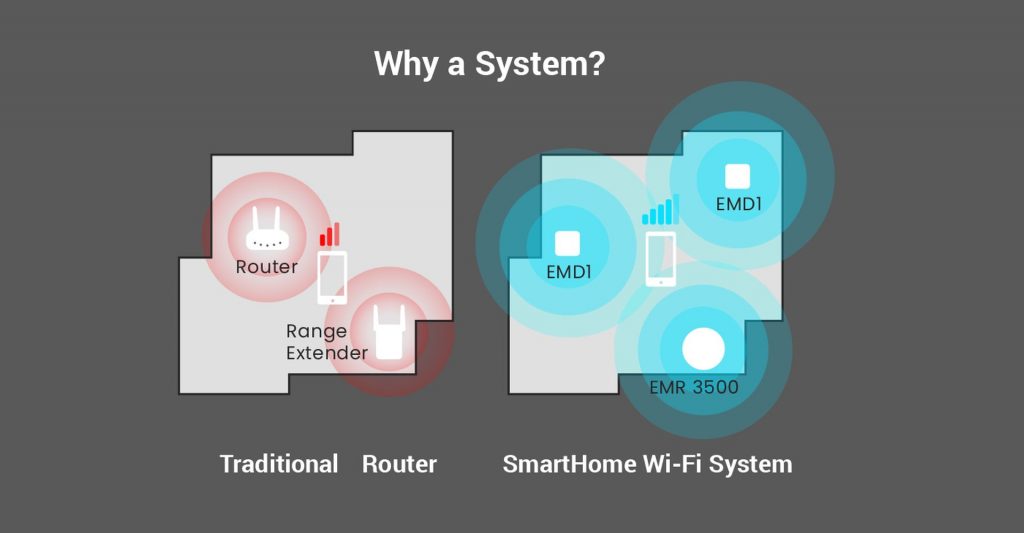Is Mesh Better Than Router?
Mesh routers have become increasingly popular in recent years because of their ability to provide more reliable, stable, and faster WiFi coverage than traditional routers. They use multiple access points to provide a larger coverage area and create a mesh network, which provides a more reliable connection. Compared to traditional routers, mesh routers can better penetrate walls and reach more parts of a home or office space. They also provide the benefit of allowing users to easily add or remove access points from the mesh network as needed. In addition, mesh routers often come with more advanced features, such as parental controls, advanced security, and easy setup. All of these factors make mesh routers a better choice than traditional routers for most people.
What is Mesh Networking?
Mesh networking is a topology that uses multiple access points to create a single wireless network. Rather than relying on a single router, mesh networking uses multiple nodes, or “points,” that are connected wirelessly and can be placed throughout a home or office. This allows for greater coverage area and faster speeds, as well as easier setup and troubleshooting. Mesh networking is a great option for users who need more coverage than a single router can provide. Mesh networks are more reliable than traditional router-based networks, as they are designed to be self-healing. If one of the nodes goes offline or fails, the network will automatically reroute traffic through the remaining nodes, ensuring that the network is up and running. Mesh networking also offers more scalability, allowing users to add additional nodes to the network without having to reconfigure the entire system. With mesh networking, users can enjoy a fast, reliable connection with fewer dead spots and less interference from other wireless networks.
What is a Router?
A router is a device that connects two or more networks together. It allows users to share files, access the Internet, and communicate with each other on different networks. Routers are typically used in homes and businesses to provide Internet access and provide a secure connection for users to access the Internet. Routers also provide a connection to other networks, such as a virtual private network (VPN). Routers are also used to provide additional security for the users and to improve the overall performance of the network. Routers come in a variety of sizes and configurations and can be used in both wired and wireless networks.
What is Mesh?
Mesh technology is a type of wireless networking that creates a single, seamless network that covers a large area. Mesh networks use multiple wireless access points to connect users within a single network, allowing for more coverage and enhanced performance. Mesh networks are typically used in larger areas such as homes, businesses, or campuses where it is difficult to cover a large area with a single router. Mesh networks are also used to provide greater security and reduce the risk of interference from outside sources. Mesh networks are designed to be more resilient than traditional wireless networks and provide better performance over longer distances.
Benefits of Mesh Networking
A mesh network offers a lot of benefits that a traditional router cannot provide. It’s not just about faster speeds or more coverage, but also about providing a more reliable connection to the internet. Mesh networks are becoming increasingly popular due to their ability to deliver a strong and reliable signal across multiple devices. This is due to their ability to create a self-organizing mesh of wireless access points that are interconnected and share the same SSID. This allows users to seamlessly switch between access points in order to maintain a strong connection. Additionally, mesh networks are also more secure than traditional routers, as they offer additional layers of security such as WPA2 encryption. Mesh networks also provide greater flexibility in terms of placement, as the wireless access points can be placed in multiple locations in order to maximize coverage. Finally, mesh networks are often easier to set up than traditional routers, and they offer a more reliable connection than routers.

Drawbacks of Mesh Networking
Mesh networking provides a lot of benefits but it also has some drawbacks that need to be considered. One of the main drawbacks is that installing a mesh network can be expensive and time-consuming. A mesh network requires more hardware than a traditional router and can require professional installation. Another downside to mesh networking is that the signal strength can be weaker than a traditional router in some areas, especially if the mesh nodes are too far apart. Additionally, mesh networks are not as secure as traditional routers since they can be more vulnerable to hacking and eavesdropping. Finally, mesh networks are not as reliable as traditional routers since they rely on multiple nodes that can fail or lose connection.
Overall, mesh networking is a great solution for providing reliable and fast internet access, but it is important to consider the drawbacks before investing in a mesh network. It is important to weigh the pros and cons of mesh networking versus a traditional router to make an informed decision on which is the best solution for your home or office.
Benefits of a Router
and Mesh Network
Modern home networks are far more complicated than they used to be. With the rise of smart devices, streaming media, gaming, and home automation, it’s necessary to have a robust network infrastructure to keep everything connected. That’s why it’s important to understand the differences between routers and mesh networks, and which is better for your home.
Routers are the traditional solution for home networking. They are typically compact devices that broadcast a dedicated Wi-Fi signal throughout your home. Routers are a great choice for single-story homes and small apartments. They are easy to setup and usually provide reliable coverage throughout the home.
Mesh networks are the new kids on the block. Instead of relying on a single router, mesh networks use multiple nodes that communicate with each other to form a single, seamless network. This makes them an ideal solution for larger homes with multiple stories or apartments with multiple rooms. Mesh networks are also great for homes with multiple devices as the nodes will spread the load of data more evenly across the network.
When it comes to choosing between a router and a mesh network, there is no clear-cut answer. It really depends on your home’s size and layout, as well as the number of devices you intend to connect. Still, it’s important to understand the benefits of each before making a decision.
Drawbacks of a Router
Routers are a popular and common choice for home networks, but they come with their own set of drawbacks. Routers are limited in their range and can be unreliable in certain circumstances. They are also vulnerable to interference from other devices, such as microwaves and TVs, which can cause connection issues or slow speeds. Additionally, routers can be difficult to set up and configure, especially if you don’t have an IT background. Finally, many routers are limited in terms of speed and bandwidth, meaning that you may not be able to get the most out of your internet connection.
FAQs About the Is Mesh Better Than Router?
1. How does a Mesh Network differ from a traditional router?
A Mesh Network uses multiple wireless access points to form a single wireless network, allowing devices to communicate with each other without having to go through a central router. This allows for better coverage and faster speeds, as well as less interference from other wireless networks.
2. What are the benefits of a Mesh Network over a traditional router?
A Mesh Network offers better coverage and faster speeds than a traditional router. It also eliminates dead spots in your home, allowing you to stay connected no matter where you are. Additionally, because multiple access points are used, you don’t have to worry about interference from other wireless networks.
3. Is a Mesh Network more expensive than a traditional router?
In some cases, a Mesh Network can be more expensive than a traditional router. However, the cost of a Mesh Network is often offset by the increased coverage and faster speeds that it offers. Additionally, many Mesh Network systems come with advanced features such as parental controls, security features, and more.
Conclusion
In conclusion, the answer to the question “Is Mesh Better Than Router?” is that it depends on the user’s individual needs and preferences. Mesh networks offer a more comprehensive solution for those who need to cover a larger area, while routers offer a more cost-effective solution for those with smaller areas to cover. Ultimately, the best solution for a user depends on their individual needs and preferences.


